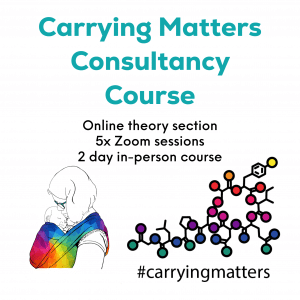
The consultancy course is focused mostly on giving trainees the skills to be an effective and supportive consultant in a carrying/babywearing/advocacy context. This course draws on my years of experience as a babywearing consultant and also as a practicing doctor for over 20 years. I have consulted with a lot of clients and patients over my working life and have learned a lot about effective communication and training from this. My colleague Kiri has worked alongside me and independently as a highly effective babywearing consultant on a daily basis for years and is very familiar with the process.
Practical skills with individual carriers are of high importance and will be covered in this course. However, these skills can be worked on daily in people’s own time, and competence and complexity will grow with personal exploration and repeated practice (for example, we will not be learning back carries with a stretchy wrap or fancy finishes with wovens).
“Soft” skills such as consulting skills, communication, problem solving, managing complex or challenging situations (such as carrying older children, working with different body shapes, carrying multiples, supporting families with disabilities) and dealing with the day in/day out logistics of working consultancy are harder to gain and these are a major focus of this training. The majority of consulting time does not involve complex techniques or unusual carriers, but the ability to listen and communicate effectively, create meaningful connections, forge trusting relationships and build confidence, using an excellent knowledge of the basics and the ability to be creative to find solutions, solve problems, or simply hold space.
Ultimately, this will lead to the effective transference of skills and knowledge to someone else that enriches their lives and the lives of children, and leaves both parties with a sense of satisfaction and positive connection.
As we designed the course, two things became clear, firstly that people really value the face-to-face element of training, especially with the more complex situations we are more likely to encounter as consultants, and secondly, that there is a huge amount of knowledge being imparted in a very short space of time, which can be challenging to absorb and then put into practice independently. We have updated our original format for 2024, creating a training journey that allows people the time they need to learn as they go, and apply their new knowledge, develop questions and build relationships while still part of the course.
Structure of the Course
The course has three sections.
-
- A comprehensive online theory section. This can be done at your own pace. It covers the science of babywearing and why it matters, learning about anatomy and physiology, sling and carrier safety as well as anthropology and cultural factors. It also covers topics such as communication skills, planning and running a consult and dealing with challenging situations, as well as how to use common carriers (teaching videos to work through) and how to prepare to offer more complex babywearing support. This will take around 12 hours. You will need your own equipment at home to use (we can provide postal kits if needed).
-
- A series of five live Zoom sessions with Rosie (and one with Kiri) where we begin understanding and practising how to use the major carrier types in depth, how to adapt them to individual needs, how to feed in them, as well as working on communication and exploring common scenarios. Each week has a different theme and you will be encouraged to put your skills to use before the next session, to allow for real-time practice and personalised feedback. You will be expected to have a solid understanding of safety and competence in basic skills before you attend these sessions (the online theory course will have given you these). These Zoom sessions are mostly 3 hours long, and dates will be agreed with each cohort.
-
A weekend of in-person learning with Rosie and Kiri at Scotia Works in Sheffield. This time is focused on perfecting and deepening advanced carrier skills and how to teach them effectively, particularly back carries with young children. We spend time putting all the techniques we have built over the course into practice in a wide variety of situations and circumstances, including families who have more complex needs, thinking about problem solving and handling difficult encounters. We look at the ‘soft skills’ that are so key to effective consultations and satisfying encounters (as well as what to do when things are not working as you had hoped) and have the time for you to explore your own particular goals.
All our trainees become part of their own cohort for discussions and feedback, as well as joining the Carrying Matters educator groups (and the UK professional groups) for ongoing support.
Course dates are live for 2024, each course will cost £600 to reflect the amount of learning time (6-8 weeks per course). Payment plans are available upon request.
Please contact me if you have any further questions or would like to register your interest!
Equipment List
To work on the online course, you will need the following
- a weighted, jointed demonstration doll
- a two way stretchy wrap (a Close Caboo is optional but encouraged)
- your base size woven wrap (the size you can comfortably do a FWCC – see here if you are not sure of your size)
- a woven wrap ring sling
- a meh dai or half buckle (ideally wrap strap)
- a rucksack buckle carrier and a cross strap buckle carrier. One of these should be adaptable to fit a newborn.
You will not need to bring all of these to the consultancy course practical sessions at the Snug, unless you have carriers you would like to bring to use on the day for familiarity. We do recommend you bring your own doll, so you can become increasingly familiar with using it (and thus with your clients).
We can provide drinks and snacks but you will need to source your own meals and accommodation.
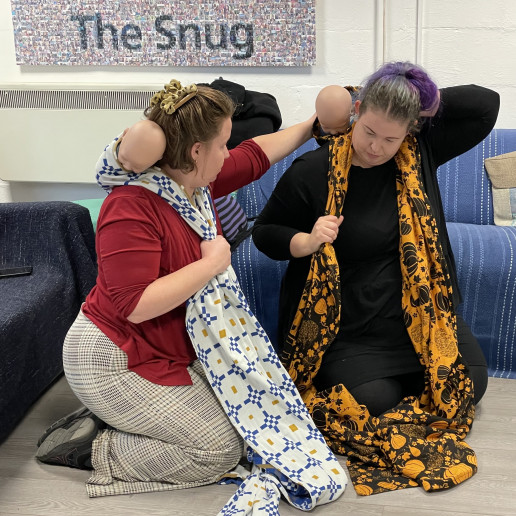
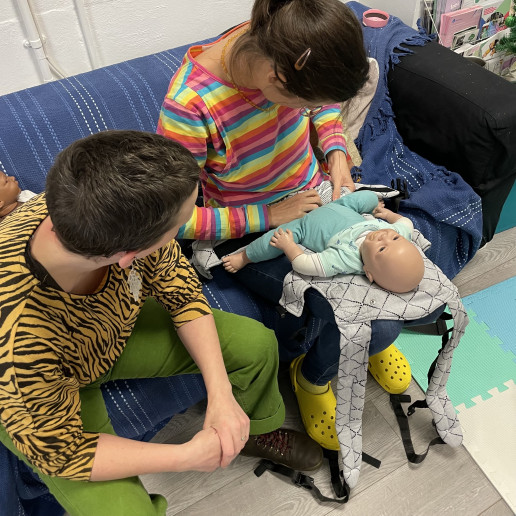
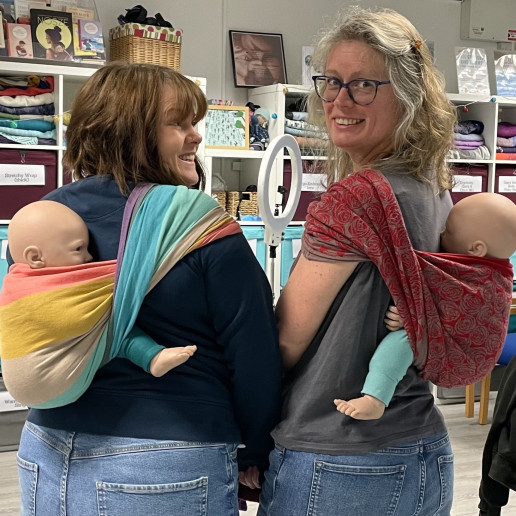
Here is some feedback from our courses.
“I loved the framing of the course – thinking about the sling consultant role as facilitating all baby carrying (not gatekeeping!). I also found it very reassuring to think of the role as being a creative & collaborative problem-solver with a good foundational knowledge. This makes much more sense than having to memorise a series of prescribed methods. Demonstrations were very clear and useful too!”
“I genuinely found everything so useful and engaging – however if I had to name specifics.. the time spent on stretchy wraps and caboos was brilliant, all the little extra skills – different ways of doing the flips, feeding, seated sideways – absolutely so valuable! The role playing and teaching.. I sometimes find this really intimidating and just clam up but the environment was held well enough for me to feel safe enough to try and miss the mark, and try again, and improve and that was fantastic to get to role play those consult scenarios, that was really very very useful to me and everything we did with back carrying newborns in Meh Dais and wovens and thinking about special circumstances was really useful. The mix of concrete information and fostering a particular open minded and creative way of thinking was absolutely spot on for me. It really shone through that this wasn’t about there being “one true way” and getting it “right” but about looking at the needs of the people in front of you and supporting them on their journey to the absolute best of your ability.”
“I found really valuable the activities thinking through all the information which would be helpful to best prepare a consult, knowing that what you have in front of you on the day may differ from what you prepared, so being ready to think on your feet to troubleshoot to help the client get the best options for them. It reinforced my belief in the importance of teaching what I know without impressing my own preferences onto my advice.”
“It was one of the best learning environments I have been in… and I love continued learning so I’m in learning spaces quite frequently. I felt welcome, safe, and cared for as a human as well as a student and consultant.”
“Getting hands on with different wraps and carriers and learning how they all work in their own way and all the options available to families. I appreciated the extra help when I was struggling to grasp certain things I wasn’t made to feel like I wasn’t good enough to be there. I enjoyed learning about everything!”
“I enjoyed being able to immerse myself in the topic for three days, being on maternity leave I think it’s the most I’ve used my brain in months! I loved the way you challenged us to question some of the “rules” of babywearing, and really justify why we do things a certain way. The role play was really hard but very worthwhile, I learned a lot from watching how other people handled it too. I’ve come home buzzing with motivation and enthusiasm.”
FAQs
Can I bring my baby/toddler?
Small babies in arms are most welcome as we recognise the importance of closeness and access to feeds, and they may lend themselves to being living demo babies! We have some baby recliners, but please bring all needed equipment.
Older children may struggle with the length of the days and become distracting, so we would ask you to consider alternative options for their care during the course (for the sake of others, as well as yourself!)
How do I get there and where do I stay?
The course is held at the Snug, 71 Leadmill Road, Sheffield, S1 4SE, very close to the city centre. It has been planned to minimise the number of nights away from home if you need to travel. We do recommend staying locally if you can, rather than long commutes twice a day, and can recommend some airBnBs on request.
Is there parking?
There is on street parking – we don’t recommend using the local DFS/Wren as they have a 2hr limit with cameras.
Is there nearby public transport?
We are very close to Sheffield Station and the bus interchange.

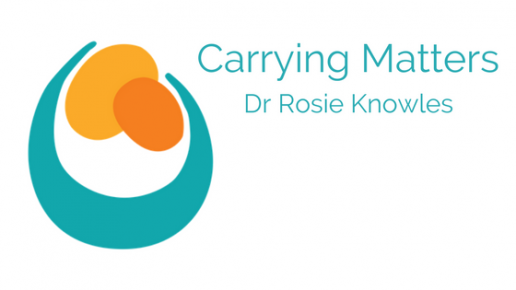
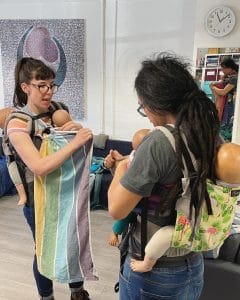
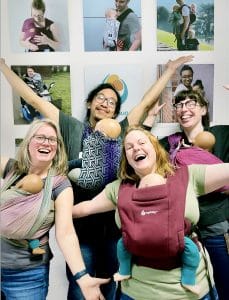 A weekend of in-person learning with Rosie and Kiri at Scotia Works in Sheffield. This time is focused on perfecting and deepening advanced carrier skills and how to teach them effectively, particularly back carries with young children. We spend time putting all the techniques we have built over the course into practice in a wide variety of situations and circumstances, including families who have more complex needs, thinking about problem solving and handling difficult encounters. We look at the ‘soft skills’ that are so key to effective consultations and satisfying encounters (as well as what to do when things are not working as you had hoped) and have the time for you to explore your own particular goals.
A weekend of in-person learning with Rosie and Kiri at Scotia Works in Sheffield. This time is focused on perfecting and deepening advanced carrier skills and how to teach them effectively, particularly back carries with young children. We spend time putting all the techniques we have built over the course into practice in a wide variety of situations and circumstances, including families who have more complex needs, thinking about problem solving and handling difficult encounters. We look at the ‘soft skills’ that are so key to effective consultations and satisfying encounters (as well as what to do when things are not working as you had hoped) and have the time for you to explore your own particular goals.